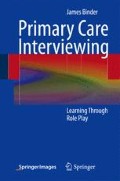Abstract
Prerequisite skills that need to be mastered before role-playing motivational interviewing with patients regarding alcohol use include self-awareness , contracting , personal story , open-ended inquiries , facilitatory gestures , empathic summaries, and third-person technique. It is particularly important that trainees have previously practiced empathetic summaries to a level of competence.
Access this chapter
Tax calculation will be finalised at checkout
Purchases are for personal use only
References
Rollnick S, William WR, Butler CC. Motivational interviewing in health care: helping patients change behavior. New York, NY: The Guilford Press; 2008.
Whitlock EP, Polen MR, Green CA, Orleans T, Klein J. Behavioral counseling interventions in primary care to reduce risky/harmful alcohol use by adults: a summary of the evidence of U.S. Preventive Services Task Force. Ann Intern Med. 2004;140:557–68.
McGinnis JM, Foege WH. Actual cases of death in the United States. JAMA. 1993;270:2207–12.
Widdowson M. Transactional analysis: 100 key points and techniques. New York, NY: Routledge; 2010.
Coulton S, Drummond C, James P, Godfrey C, Bland JM, Parrott S, et al. Opportunistic screening for alcohol use disorders in primary care: comparative study. BMJ. 2006;332:511–7.
U.S. Preventive Services Task Force. Screening and behavioral counseling interventions in primary care to reduce alcohol misuse: recommendation statement. Ann Intern Med. 2009;140:554–6.
Miller WR, Walters ST, Bennett ME. How effective is alcoholism treatment in the United States. J Stud Alcohol. 2001;62:211–20.
Platt FW, Gordon GH. Field guide to the difficult patient interview. 2nd ed. Philadelphia, PA: Lippincott Williams & Wilkins; 2004.
National Institute on Alcohol Abuse and Alcoholism (NIAAA). Helping patients who drink too much: a clinician’s guide. Washington, DC: GPO; 2005 (NIH, 301-443-3860, http://www.niaaa.nih.gov).
Clark W, Parish S. Alcohol interviewing and advising. In: Novack DH, Clark WD, Daetwyler C, Saizow DB, editors. doc.com – an interactive learning resource for healthcare communication [Internet]. Philadelphia, PA: American Academy on Communication in healthcare/Drexel University College of Medicine. Accessed on 21 May 2012. http://www.AACHonline.org.
Clark W. Alcohol and substance abuse. In: Feldman M, Christensen J, editors. Behavioral medicine: a guide for clinical practice. New York, NY: McGraw Hill; 2008.
Shea SC. Psychiatric interviewing: the art of understanding: a practical guide for psychiatrists, psychologists, counselors, social workers, nurses, and other mental health professionals. 2nd ed. Philadelphia, PA: WB Saunders; 1998.
Saitz R. Unhealthy alcohol use. N Engl J Med. 2005;352:596–607.
Clark W, Parish S. Alcohol: interviewing and advising. In: Novack DH et al., editors. doc.com – an interactive learning resource for health communication [Internet]. Philadelphia, PA: American Academy on Communication in Healthcare/Drexel University College of Medicine. Accessed 15 Feb 12. http://www.AACHonline.org.
Williams EC, Kivlahan DR, Saitz R, Merrill JO, Achtmeyer CE, McCormick KA, et al. Readiness to change in primary care patients who screened positive for alcohol misuse. Ann Fam Med. 2006;4:213–20.
Shea SC. Improving medication adherence: how to talk with patients about their medications. New York, NY: Lippincott Williams and Wilkins; 2006.
Keller VF, Kemp-White M. Choices and changes: a new model for influencing patient health behavior. J Clin Outcomes Manag. 1997;4:33–6.
Brown S, Lewis VM. The alcoholic family in recovery: a developmental model. New York, NY: The Guilford Press; 2002.
Author information
Authors and Affiliations
Rights and permissions
Copyright information
© 2013 Springer Science+Business Media New York
About this chapter
Cite this chapter
Binder, J. (2013). Motivational Interviewing. In: Primary Care Interviewing. Springer, New York, NY. https://doi.org/10.1007/978-1-4614-7224-7_18
Download citation
DOI: https://doi.org/10.1007/978-1-4614-7224-7_18
Published:
Publisher Name: Springer, New York, NY
Print ISBN: 978-1-4614-7223-0
Online ISBN: 978-1-4614-7224-7
eBook Packages: MedicineMedicine (R0)

